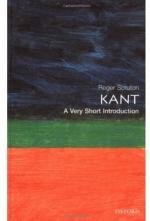
|
| Name: _________________________ | Period: ___________________ |
This quiz consists of 5 multiple choice and 5 short answer questions through Chapter 3: The Transcendental Deduction.
Multiple Choice Questions
1. What did Kant have published before 1781?
(a) A few unremarkable, short books.
(b) "Critique of Pure Reason".
(c) "Critique of Judgment".
(d) Nothing.
2. What did Kant's subjective argument concern?
(a) Proving that the self is a property.
(b) Explaining the faculties of understanding the self.
(c) Explaining the proof that the self exists.
(d) Proving that the self is a substance.
3. Which of the following would have best described Kant?
(a) Annoying.
(b) Eccentric.
(c) Strict.
(d) Uncreative.
4. What statement sums up Descartes' certain piece of knowledge?
(a) "I live, therefore I am."
(b) "I think, therefore I am."
(c) "I see, therefore I am."
(d) "I exist, therefore I am."
5. According to Scruton, Kant was the first philosopher since whom to place a significant emphasis on aesthetics?
(a) Plato.
(b) Hume.
(c) Leibniz.
(d) Aristotle.
Short Answer Questions
1. What type of truth is "Fido has brown spots"?
2. In what year was Kant born?
3. Which philosopher did Kant begin his arguments similar to?
4. When did Kant publish "Prolegomena to any Future metaphysic which shall lay Claim to being a Science"?
5. What are the first types of truths, according to Kant?
|
This section contains 189 words (approx. 1 page at 300 words per page) |

|




